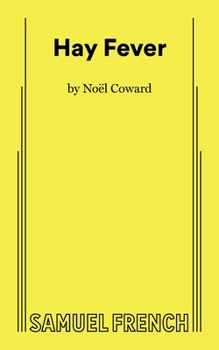Hay Fever
Select Format
Select Condition 
Book Overview
Hoping for a quiet weekend in the country with some guests David Bliss a novelist and his wife Judith a retired actress find that an impossible dream when their high-spirited children Simon and Sorel appear with guests of their own. A housefull of drama waits to be ignited as misunderstandings and tempers flare. With Judith's new flame and David's newest literary 'inspiration' keeping company as the children follow suit the Bliss family lives up to its name as the 'quiet weekend' comes to a
Format:Paperback
Language:English
ISBN:0573610045
ISBN13:9780573610042
Release Date:August 2014
Publisher:Concord Theatricals
Length:98 Pages
Weight:0.20 lbs.
Dimensions:0.2" x 5.0" x 8.0"
Customer Reviews
3 ratings
Hay Fever
Published by Thriftbooks.com User , 18 years ago
A delightful story as relevant today as it was when Noel Coward first wrote it and had it performed in London. CLM
"Do you think they know they are mad?"
Published by Thriftbooks.com User , 19 years ago
Written when Coward was only twenty-four, and produced shortly after, in 1925, Hay Fever is a broad, manic farce which takes place in the country house of a self-absorbed, artistic family. The Blisses, each of whom is creative and spontaneous, ignore the stultifying conventions of society--Judith, an extravagant stage actress, who pursues her own whims whenever it pleases her; her husband David, an author, who enjoys his own spotlight and camp-followers; and their adult children, Simon and Sorel. When Sorel announces that she has invited a weekend guest and would like to be able to use "the Japanese room," she quickly discovers that each of the other family members has also invited a guest for "the Japanese room." In the course of the weekend, all the guests--conventional people attracted by the exciting lives these non-conformists have created for themselves--find themselves at the mercy of their more confident and assertive hosts. Guests who arrive thinking themselves in love with one person find themselves unexpectedly engaged to marry someone else. No one listens to them, no one recognizes them as individuals, and no one cares about their dashed expectations. As the Bliss family controls the activity during the weekend, the farce borders on absurdity. Outrageous scenes and emotional confrontations, part of their "normal" lives, prove too much for their guests. The fast-paced interaction one sees on stage constitutes the only "plot," and there are no background stories to add complexity. What you see is obvious--what Coward has intended you to see. Far less subtle than some of his later work and lacking the cynicism and clever repartee for which Coward later became known, the play nevertheless incorporates many of Coward's trademark themes--the sense of entitlement by artists (some of which, he hints, is because they really are superior), their flamboyant behavior, the casual attitudes toward marriage and sex, their egotism and insensitivity to "ordinary" people, along with their sense of fun as they pursue their own pleasure. These themes are all set into sharp relief by the behavior and attitudes of the guests, who gain no audience sympathy for their predicaments because they are decidedly dull. Though some believe that this is one of Coward's best plays, others will prefer the clever repartee, wit, and irony of the later plays, which tend to have a more intimate focus and smaller cast of characters. n Mary Whipple
Hit cast, hit comedy.
Published by Thriftbooks.com User , 25 years ago
Noel Coward delights again with this hilarious partner-swapping comedy. The performers joyfully embrace the material as Coward explores the wonderness and the pitfalls of love and desire.






